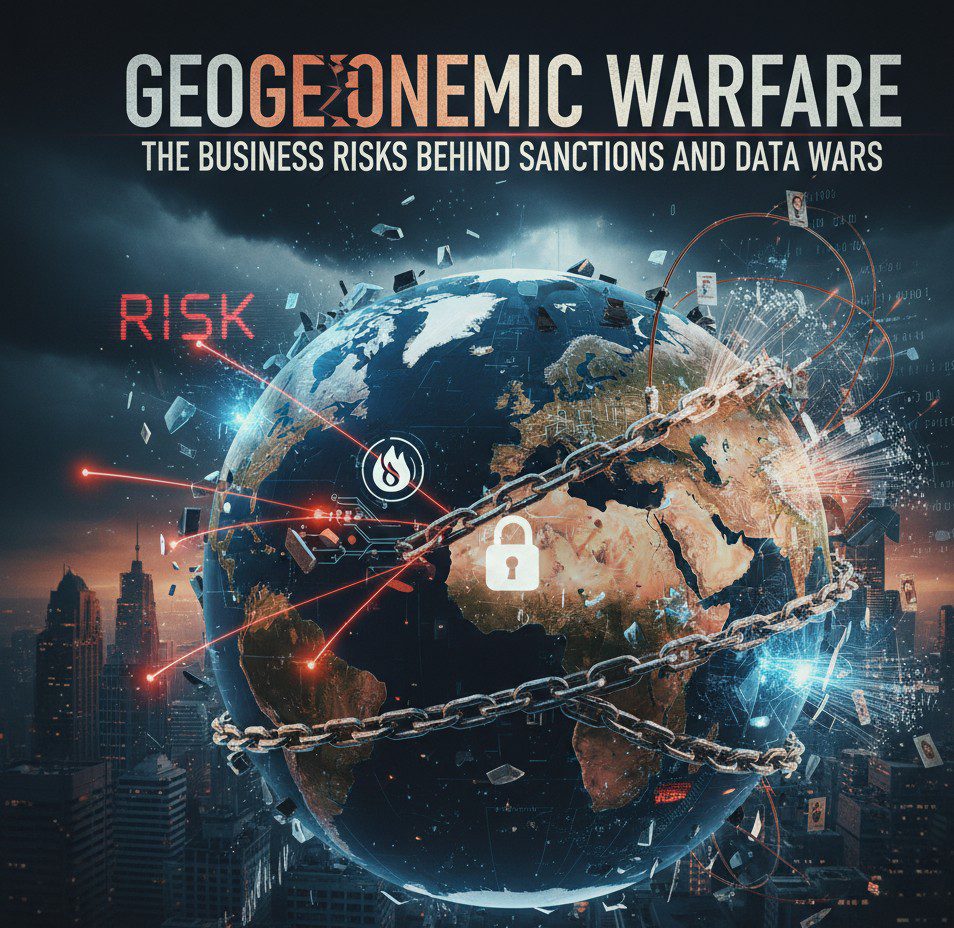Geoeconomic Warfare: The Business Risks Behind Sanctions and Data Wars

By Brutnow Team | insights & Intelligence | Brutnow Media
The New Battlefield: Economics as a Weapon
In the 21st century, wars are increasingly fought without bullets. Nations now use economic power — trade restrictions, sanctions, and data control — as strategic tools of dominance. This form of geoeconomic warfare is quietly reshaping global business and testing the resilience of corporations that once thrived in a globalized, borderless world.
From semiconductor sanctions between the U.S. and China to Russia’s exclusion from international payment systems, every economic front is now a geopolitical chessboard. Businesses, caught in the crossfire, must adapt faster than ever before.
Sanctions and the Corporate Shockwave
Sanctions, once targeted tools for diplomacy, have evolved into a full-scale economic weapon. The ripple effects extend beyond governments to the private sector — disrupting supply chains, investment flows, and strategic alliances.
In 2025 alone, over 1,500 new sanctions were imposed globally, according to the Kiel Institute for the World Economy. Financial institutions, logistics firms, and even technology startups have found themselves inadvertently entangled in global politics.
For multinational corporations, compliance is no longer just legal — it’s existential. A single misstep in sanction screening can freeze millions in assets or sever access to key markets overnight.
Data Wars: The Battle for Digital Sovereignty
While sanctions dominate headlines, the silent struggle over data may prove even more consequential. As governments push for data localization and digital sovereignty, businesses face mounting challenges in managing cross-border data flows.
The rise of “data nationalism” — policies that restrict where and how data is stored or processed — threatens the global cloud economy. Nations now view information as a strategic resource, not just a commercial asset.
For companies dependent on global data infrastructure, compliance with varying regional rules (like the EU’s GDPR, China’s CSL, and emerging Middle East data frameworks) has become a maze of legal and operational complexity.
The Hidden Business Risks
Geoeconomic warfare affects more than just trade statistics. It touches every layer of corporate strategy:
Supply Chain Volatility: Sudden restrictions on exports or components can halt production.
Financial Fragility: Sanctions disrupt payment systems and limit access to capital markets.
Cyber Exposure: Nation-state cyberattacks often accompany economic tensions.
Reputation Damage: Aligning with the wrong partner or jurisdiction can attract public backlash.
Regulatory Uncertainty: Constantly changing compliance rules increase costs and delays.
Even small and mid-sized businesses, particularly those in digital services or manufacturing, are no longer immune. The fragmentation of the global economy means that every firm is now a geopolitical actor — whether it intends to be or not.
Strategic Adaptation: Survival in a Fragmented World
In this volatile environment, businesses must shift from reaction to resilience. Here’s how leading corporations are adapting:
1. Geoeconomic Risk Mapping: Identifying exposure to sanctioned jurisdictions, restricted technologies, and data barriers.
2. Localized Operations: Setting up regional hubs for data, finance, and logistics to avoid cross-border vulnerabilities.
3. Supply Chain Diversification: Reducing dependency on any single nation or sector.
4. Cyber Resilience Investment: Integrating cybersecurity into board-level strategy.
5. Strategic Intelligence (OSINT): Tracking political and economic signals to anticipate risk.
For companies like Keepcastle Group and Brutnow Media, integrating geopolitical and cyber awareness into decision-making isn’t optional — it’s a competitive advantage.
The Future of Economic Power
Geoeconomic warfare signals a permanent shift: from global integration to controlled interdependence. Businesses that treat geopolitics as an operational variable — not just a background factor — will be the ones that survive and lead.
The next decade will test which firms can build resilience amid fragmentation, navigate sanctions, protect digital assets, and leverage data ethically yet strategically.
In a world where power is measured not by armies, but by algorithms and assets, the greatest business risk is ignorance of the invisible wars already underway.




